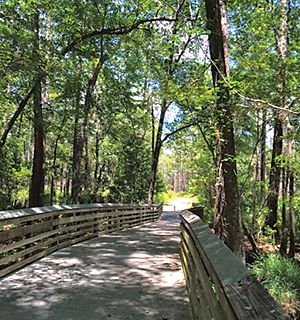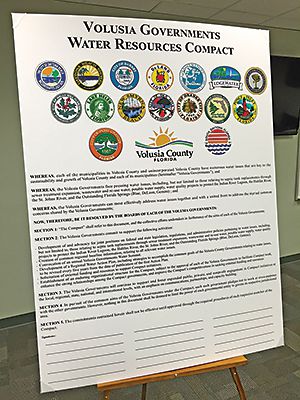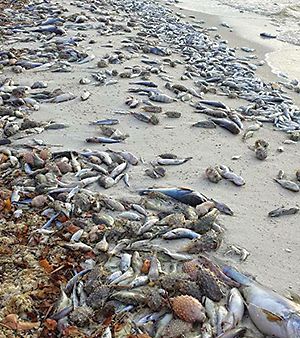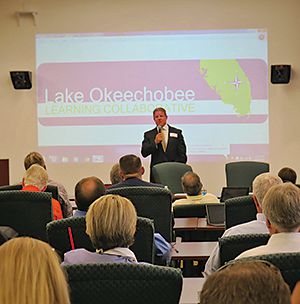
Matthew Surrency
President, Florida League of Cities;
Mayor, City of Hawthorne
For more information about regional compacts taking shape around the state, visit FloridaLeagueOfCities.com or contact the League office at 850-222-9684.
One year ago, the Florida League of Cities embarked on a journey to unite cities within regional clusters to identify and solve shared challenges that cross municipal boundaries. We know local governments, with their high approval ratings and strong commitment to citizen engagement, have a unique ability to deliver solutions efficiently and without the unnecessary influence of party politics. Imagine the progress that will be achieved when cities unite together to solve common problems. Inspired by four southeast Florida counties that came together seven years ago to address regional flooding, the Florida Regional Compact Initiative (FRCI) was born.
From economic development to addressing water quality, cities around the state are recognizing the value of forming natural alliances as agents for collective change.
At its most basic, a compact is just a written agreement that commits its signatories to doing something. The concept is not new. In fact, committing to this form of collaboration might even sound a bit duplicative of other regional planning efforts. The difference is that cities take a formal vote to join the compact and then work together to coordinate the recommended activities across jurisdictional boundaries.
And it’s working.
When done right, a compact can empower cities to not only share ideas and learn from one another but also leverage resources available to them including enhanced levels of funding from federal, state and nonprofit institutions.
Around the state, multiple regions are using the tools and resources of the FRCI to convene conversations focused on engagement and connection. Cities are partnering with their constituents, academia, the business community, and the nonprofit sector to identify the salient issues facing their region, cultivate the partnerships to tackle these issues together and build consensus on what the solutions should be.
Through these conversations, Florida cities have discovered the elements needed to sustain these collaborations into the future.
- Leadership by elected officials. Every idea requires leadership if it is going to be great. Leaders must be local. They must be passionate. They must be willing to work.
- Commitment from the community. For the effort to get off the ground, it must be important to the community at large. Stakeholder groups should become the avid champions for the cause to continue.
- Partnerships with academic, business and non-governmental organizations. In areas with limited resources, it is essential to identify the natural alliances available and engage them early. They are also a prime choice for mediating work plan development.
- Small, deliberate steps. We sometimes focus so much on a distant solution that we stumble along the path immediately before us. This leads to great ideas but very little action. By taking small, deliberate steps, we are able to move forward while building confidence and constantly monitoring progress.
With three formal compacts signed and two other regions in the initial phases, Florida’s cities are redefining collaboration. The Legislature is taking note. The media is paying attention. Constituents are energized.
And this is just the beginning.
Florida Regional Compact Initiative — Around the State
OUTDOOR RECREATION ON THE RIVER

Throughout the Suwannee River Basin, municipalities have joined forces to enhance and improve the greenway and trail properties in their communities to attract economic development and tourism.
“Our efforts have attracted the attention of the state, the water management district, bicycle and trail associations, and multiple paddling outfitters and equestrian groups wanting to invest resources to see the effort grow.”
– Councilmember Helen Miller, Town of White Springs
WATER summit AT STETSON

In Volusia County, representatives from the 16 municipalities and the county held their first summit at Stetson University to discuss the focus of their compact — improving water quality and quantity in their multiple river systems and three outstanding Florida springs. .
“The greatest success at this point is watching leaders come together to understand this project and move it forward. This involves looking at the regional issues and recognizing that collaboration can be a positive thing for our future.”
– Commissioner Heidi Herzberg, City of Deltona
INDIAN RIVER LAGOON

Spurred to action due to the massive fish kill in the Indian River Lagoon (IRL) this past spring, the Space Coast League of Cities and Treasure Coast Regional League of Cities joined together to create the IRL Compact — One Lagoon,
One Community, One Voice.
“Because so much of the land in the area is unincorporated, the cities knew we had to engage the counties, port authority and Air Force base in this process. The [compact] framework has helped us build stakeholder engagement and get their commitment to be a part of the solution.”
– Councilmember Stephany Eley, City of West Melbourne
LAKE OKEECHOBEE LEARNING COLLABORATIVE

Lee County mayors are using the compact framework to unite cities across South Florida impacted by discharges from Lake Okeechobee. In late June, Fort Myers hosted a meeting with attendees from as far east as Stuart and as far south as the Florida Keys to discuss shared water challenges and identify opportunities to collaborate across jurisdictional boundaries. .
“Too often action is taken to remedy a situation in one community resulting in unintended consequences for another. By establishing a shared vision by all cities impacted — without displacing one group over another — we can articulate priorities for joint advocacy.”
– Mayor Kevin Ruane, City of Sanibel












